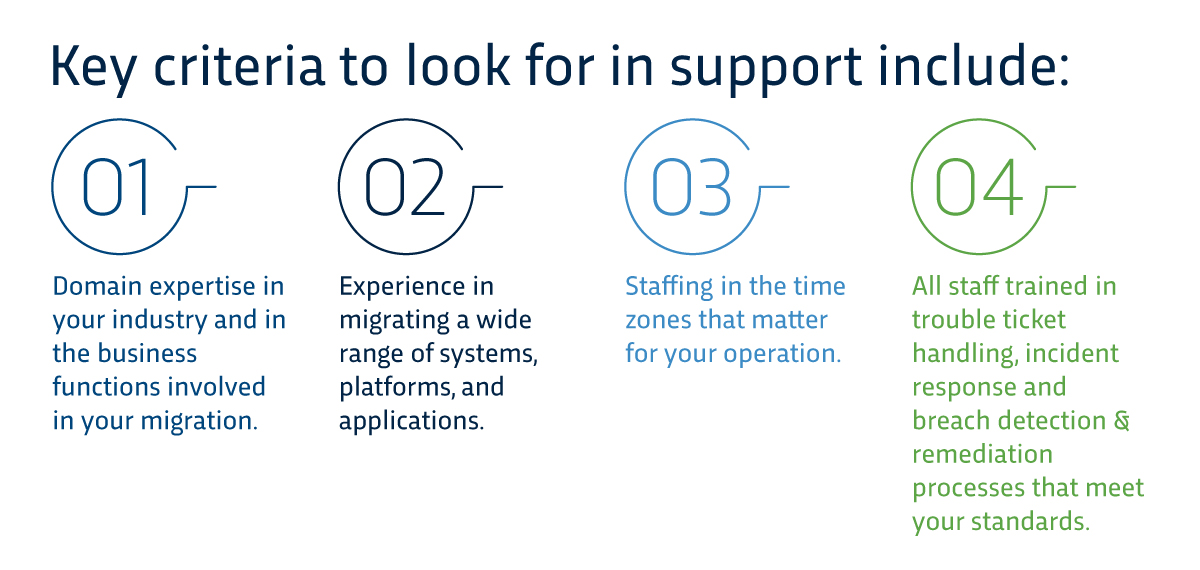Cloud computing has long showed promise as a source of competitiveness, based on the cost savings, scalability, and agility it affords the organizations that adopt it. Even with privacy and security concerns, the benefits accruing to early adopters made their cloud computing use cases very compelling examples to follow as a sound business strategy. Then the COVID-19 pandemic sealed the fate of cloud computing as a cornerstone and accelerator of digital transformation.
Yet even with such clear and compelling reasons to migrate data storage and processing to the cloud, a top priority when doing it is to ensure business continuity. That goal is best achieved when combining the business knowledge of your management team with the process expertise of an experienced cloud migration service provider that can help ensure you realize the top 5 benefits of cloud migration solutions.

1. Having Concrete Plans in Place
As the old adage goes, if you fail to plan, you’re planning to fail. When preparing for cloud migration, you need to take this saying to heart. Not planning in the right way or overlooking key processes or functions could lengthen your migration process, add unforeseen costs to it, or undermine the process entirely. Any of those bad outcomes can easily be avoided by partnering with a cloud migration services provider with prior experience working with organizations just like yours.
Moving to the cloud involves changes across the organization that affect people, processes, and technology alike, and there will inevitably be questions you need to answer. For example, how much downtime should we expect? How will we transfer all of our data to the cloud? How long will the project take? These are just a few of the many questions you might face.
What if the migration plan fails?
This is a worst-case scenario that many companies don’t plan for, and it can lead to massive amounts of downtime and can tank your standing as an IT leader. However, by partnering with a cloud migration service provider, you can lay out a back-out plan to get end-users back on their feet as quickly as possible.
2. Mitigating Costly Mistakes
Overlooking data dependencies and system integrations. Trying to make multiple significant system changes all at once. Neglecting to implement new security standards for end-users. Failing to anticipate the need for robust and consistent connectivity. These are just a handful of possible mistakes with costly implications that companies could make when trying to make a cloud migration by themselves.
Cloud migration is a complicated process, and if this is unfamiliar territory for your team you essentially would be walking alone through a minefield while blindfolded. And one misstep could wind up being very costly, but with guidance from an experienced cloud migration services provider, you can avoid these mistakes.
3. Access to Experienced Support
Migrating your systems to the cloud is a substantial undertaking, and unexpected issues can hamper your migration if they aren’t resolved promptly. Allowing for the unexpected is one of the most important reasons to work with an experienced cloud migration services provider. A critical enabler to a successful cloud migration is how well your cloud migration services provider supports your team’s needs and/or supplements their skills.

Key criteria to look for in support include:
- Domain expertise in your industry and in the business functions involved in your migration.
- Experience in migrating a wide range of systems, platforms, and applications.
- Staffing in the time zones that matter for your operation.
- All staff trained in trouble ticket handling, incident response and breach detection & remediation processes that meet your standards.
4. Using a Proven Migration Model
One of the greatest benefits of working with an experienced cloud migration services provider is gaining what they’ve already seen, learned and baked into their migration models. By contrast, if you were to attempt a migration on your own, you might not have processes built out for a clean migration. And another risk is that you might not have the experienced staff needed to carry out your plan.
At Syntax, we’ve broken down our cloud migration solution into three components: discovery, readiness assessment, and readiness planning.
Discovery
During the discovery phase, our representatives will hold a workshop with the responsible parties from your business to evaluate your current IT infrastructure, go over your goals and priorities, and set reasonable expectations. The result is a clearly defined roadmap for deploying your systems into the cloud.
Readiness Assessment
The readiness assessment phase consists of two parts. The first is a thorough investigation of your current IT systems. The second is creating an architectural blueprint of how your systems should be set up in the cloud.
Readiness Planning
Once we’ve established what infrastructure will be needed and how it should be designed, we can create a plan to migrate your applications and systems to the cloud. This is when you’ll receive a cost estimate for the project and choose the operating model that works best for your business.
Following a proven migration model, like the one we offer at Syntax, allows you to make a smooth transition to the cloud.
5. Creating a Valuable Partnership
Once your systems have moved into the cloud, there are a variety of innovations and improvements that your business can take advantage of.
For instance, if your IT team lacks the number of technicians to continuously monitor and improve your SAP applications or your Oracle E-Business Suite, ERP systems, then Application Management Services is a logical next step.
Or, if your business wants to maximize its ROI on all the data it collects, Business Analytics is a service you should look into.
Cloud migration service providers like Syntax have years of experience hosting, managing, and offering innovative solutions for cloud ERP systems. However, once your migration project is completed, it’s worth considering what other services you may need to ensure your cloud infrastructure is working at peak efficiency.

Choosing the Right Cloud Migration Partner
Not all cloud migration services providers are created equal. Partnering with the right one can mean the difference between a successful outcome and a logistical nightmare. In the following sections of this article, we detail 3 types of considerations to bear in mind when choosing a cloud migration partner – general considerations, issues of compatibility, and security matters.
General Details to Consider
Migrating your IT systems to the cloud is no trivial task. These systems form the foundation of your organization’s functional core, and increasingly fuel its engines of innovation. As a result, if your migration doesn’t go as planned, it can be disastrous for the company and your credibility as an IT leader. That’s why you need to be thorough in researching any potential strategic partners. These are three general aspects of any potential service provider that you should investigate.
1. Experience Level
The first thing you need to research is a service provider’s level of experience with the cloud and migrations. Any service provider worth their salt will be upfront about their employee’s experience levels. You want a partner whose employees have obtained the certifications relevant to your business IT systems. And while that certainly includes certification relevant to your chosen ERP, you also need to ensure they’re capable of managing your other critical systems.
Take the time to review the service provider’s case studies and ask for recommendations from other clients. If they’ve done an excellent job, their current and previous partners will be sure to tell you.
2. Contractual Compatibility
Next, you need to ensure that the terms of the contract with the service provider fits the level of flexibility you need for your project. Look for terms that provide you with multiple cloud options that can accommodate your company’s unique needs and unforeseen contingencies.
3. Innovative Leadership
Finally, make sure you choose a service provider that won’t stagnate. You need a growth-oriented partner who is constantly investing in and innovating their systems. After all, if a provider isn’t working to improve their own systems, how can they work to improve yours.

Compatibility Matters
Finding a qualified service provider is only the first part of the equation. Their certifications and customer reviews might make them sound great on paper, but you need to ensure that your business’s needs are compatible with the service they can provide. Consider the following when deciding if a service provider is the right fit for your business.
1. 24/7 Support Network
It’s no secret that time is of the essence when your systems go down. Downtime brings your normal operations to a halt and can wind up costing your business hundreds of thousands of dollars. In addition, if you don’t perform your due diligence, you can easily wind up waiting in long service queues that will result in longer downtimes and more money lost.
You must partner with a cloud service provider that has enough certified staff available in your time zone. As a best practice, look for service providers with SLAs that guarantee availability, security, compliance, and performance in their disaster recovery plans.
2. Scalability
Additionally, you should look for a partner capable of helping you scale as you grow. If they can’t add additional servers and storage when you need them, they will eventually become an obstacle to your business’s plans for expansion.
Keep Security Top-of-Mind
Equally devastating to the best-laid plans as unexpected system downtime would be a security breach. While downtime is frustrating and can hurt your bottom line, a security breach could have material bottom-line impacts through the loss of proprietary information, violation of compliance rules, and result in destroying your company’s shareholders’ and customers’ trust. For that reason, keeping customer and business information secure needs to be a top priority. There are three aspects of IT security that you should consider when choosing a partner.
1. Security Tools
When choosing a cloud service provider, ensure you get as much information about their security practices as possible. For example, does your prospective partner offer services like Managed Endpoint Detection and Response? Or have they fallen behind the curve by using outdated tools that are easy for cyber threat actors to circumvent?
The types of tools they use can also indicate how involved they are in their security operations. For example, are they taking action and logging potential threats, or are they running on autopilot and only taking action once a security threat has emerged?
2. In-House Response Teams
You should also learn whether they keep qualified security personnel in-house. The IT shortage is affecting all industry sectors, and cloud service providers aren’t exempt. Some businesses outsource their IT security in lieu of taking on the cost of staffing in-house.
So if a security breach occurs, your recovery efforts are at the whim of a 3rd party that you might not even be aware of. Make sure your partner has qualified in-house IT security experts who can help you should the worst happen.
3. Experience Resolving Incidents
When it comes to preventing and resolving security breaches, having an experienced partner is critical. Some security breaches will require response teams to work with outside organizations like the FBI and legal counsel. Ask whether they are experienced in working with these types of organizations. It’s also best to ask how many security issues they’ve resolved.
Syntax Cloud Migration Solutions
When you’re migrating your mission-critical systems to the cloud, an experienced service partner can help you ensure a smooth transition each step along the way.
After years of providing managed cloud services for mission-critical applications, such as SAP and Oracle ERP systems, Syntax can help you devise and execute a strategy to move your IT systems into the cloud as seamlessly as possible.
Our proven processes have helped business leaders across the globe take advantage of all the benefits cloud computing has to offer.

Take the Next Step
If you’re ready to begin your transition into the cloud, take a closer look at how Syntax can support your cloud migration needs across multiple platforms, or contact us to explore options with a cloud migration specialist today. Our cloud migration specialists are ready to help you take the next steps.

